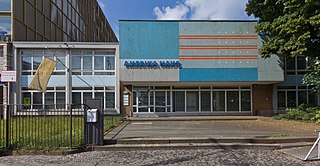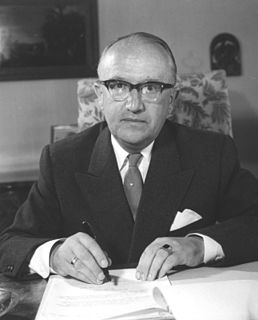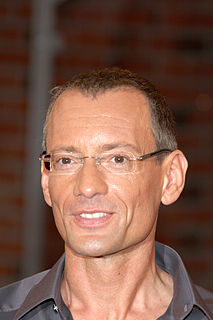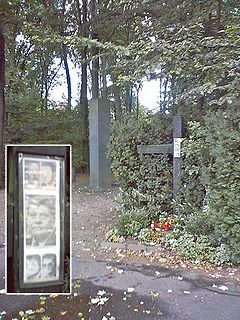 W
WThe history of Germany from 1945–1990 spans the period following World War II during the Division of Germany. The Potsdam Agreement was made between the major winners of World War II on 1 August 1945, in which Germany was separated into spheres of influence during the Cold War between the Western Bloc and Eastern Bloc.
 W
WAktuelle Kamera was the flagship television newscast of Deutscher Fernsehfunk, the state television broadcaster of the German Democratic Republic (DDR). On air from 21 December 1952 to 14 December 1990, Aktuelle Kamera was one of the main propaganda tools of the East German government.
 W
WThe Amerika Haus Berlin is an institution that was developed following the end of the World War II, to provide an opportunity for German citizens to learn more about American culture and politics, and engage in discussion and debate on the transatlantic relationship. Run by the American government until 2006, Berlin's Amerika Haus is one of many Amerika Häuser located across Germany.
 W
WBegrüßungsgeld was, from 1970 until 29 December 1989, a gift from the government of the Federal Republic of Germany to visitors from the German Democratic Republic. This situation originated with the policy of the GDR government restricting the amount of East German Marks (M) that could be exchanged into Deutsche Marks (DM) by GDR citizens when on approved travel to the West. At first, the GDR allowed the exchange of 70 M annually into DM, however by 1989, this sum was reduced to 15 M annually, which greatly restricted the ability of GDR citizens to travel to the West, even if they were approved to do so.
 W
WThe Berlin Air Safety Centre (BASC) was established by the Allied Control Council's Coordinating Committee on 12 December 1945. It was located in the former Kammergericht Building, on Kleistpark, Berlin. Operations began in February 1946 under quadripartite flight rules Paragraph 4. Paragraph 4 of the rules begins: "The Berlin Air Safety Centre has been established in the Allied Control Authority Building with the object of ensuring safety of flights for all aircraft in the Berlin area. BASC regulates all flying in the Berlin control zone and also in the corridors extending from Berlin to the boundaries of adjacent control zones."
 W
WThe Berlin Blockade was one of the first major international crises of the Cold War. During the multinational occupation of post–World War II Germany, the Soviet Union blocked the Western Allies' railway, road, and canal access to the sectors of Berlin under Western control. The Soviets offered to drop the blockade if the Western Allies withdrew the newly introduced Deutsche Mark from West Berlin.
 W
WThe Berlin Crisis of 1961 occurred between 4 June – 9 November 1961, and was the last major European politico-military incident of the Cold War about the occupational status of the German capital city, Berlin, and of post–World War II Germany. The Berlin Crisis started when the USSR issued an ultimatum demanding the withdrawal of all armed forces from Berlin, including the Western armed forces in West Berlin. The crisis culminated in the city's de facto partition with the East German erection of the Berlin Wall.
 W
WOn 5 April 1986, three people were killed and 229 injured when La Belle discothèque was bombed in the Friedenau district of West Berlin. The entertainment venue was commonly frequented by United States soldiers, and two of the dead and 79 of the injured were Americans.
 W
WOtto Albrecht Alfred von Bolschwing was a German SS-Hauptsturmführer in the Nazi Sicherheitsdienst (SD), Hitler's SS intelligence agency. After World War II von Bolschwing became a spy and worked for the Central Intelligence Agency (CIA) in Europe and later in California.
 W
WThe Federal Agency for Civic Education is a German federal government agency responsible for promoting civic education. It is subordinated to the Federal Ministry of the Interior, Building and Community. Thomas Krüger has served as President of the agency since 2000. The modern agency was established in West Germany in 1952 by the Adenauer government to counteract communism during the Cold War, but it has its roots in earlier government agencies dating back to the First World War.
 W
WThe Freedom Bell in Berlin, Germany, is a bell that was given as a gift from Americans to the city of Berlin in 1950 as a symbol of anti-communism, and was inspired by the American Liberty Bell. Since 1950, the bell has been located in the Rathaus Schöneberg, the former city hall of West Berlin.
 W
WThe Gera Demands were a set of demands made by East German leader Erich Honecker on 13 October 1980. Directed at the West German government, they called for far-reaching foreign policy concessions.
 W
WThe German Federal Archives or Bundesarchiv (BArch) are the National Archives of Germany. They were established at the current location in Koblenz in 1952.
 W
WA ghost station is a disused train station through which revenue-service passenger trains pass but at which they do not stop. The term is also sometimes used for any unused underground station or any unused station at all, whether or not revenue-service trains pass by them at all.
 W
WThe Government Bunker (Regierungsbunker) in Germany, officially named Ausweichsitz der Verfassungsorgane des Bundes im Krisen- und Verteidigungsfall zur Wahrung von deren Funktionstüchtigkeit (AdVB), in English: "Emergency Seat of the Federal Constitutional Organs for the State of Crisis or State of Defence to Maintain their Ability to Function" was a massive underground complex built during the Cold War era to house the German government, parliament and enough federal personnel needed to keep the government working in the event of war or severe crisis. Located only about 25 kilometres (16 mi) south of Bonn, Germany, in the Ahr Valley between the towns of Ahrweiler and Dernau, it was one of the best kept secrets of West Germany. It was built between 1960 and 1972 inside two abandoned railway tunnels that were built as part of the Strategic Railway, maintained and kept in a working condition for about 30 years and decommissioned in 1997. A small part of the once-secret site is now open to the public as Government Bunker Documentation Site, while the vast majority is abandoned and sealed.
 W
WThe Guillaume affair was an espionage scandal in Germany during the Cold War. The scandal revolved around the exposure of an East German spy within the West German government and had far-reaching political repercussions in Germany, the most prominent being the resignation of West German Chancellor Willy Brandt in 1974.
 W
WThe Hallstein Doctrine, named after Walter Hallstein, was a key principle in the foreign policy of the Federal Republic of Germany from 1955 to 1970. As usually presented, it prescribed that the Federal Republic would not establish or maintain diplomatic relations with any state that recognized the German Democratic Republic. In fact it was more nuanced. There was no public official text of the "doctrine", but its main architect, Wilhelm Grewe, explained it publicly in a radio interview. Konrad Adenauer, who served as Chancellor of Germany from 1949 to 1963, explained the outlines of the policy in a statement to the German parliament on 22 September 1955. It meant that the Federal German government would regard it as an unfriendly act if third countries were to recognize the "German Democratic Republic" or to maintain diplomatic relations with it – with the exception of the Soviet Union. The West German response to such could mean breaking off diplomatic relations, though this was not stated as an automatic response under the policy and in fact remained the ultima ratio.
 W
WHIAG was a lobby group and a denialist veterans' organisation founded by former high-ranking Waffen-SS personnel in West Germany in 1951. Its main objective was to achieve legal, economic and historical rehabilitation of the Waffen-SS.
 W
WThe Kampfgruppe gegen Unmenschlichkeit (KgU) was a German anti-communist resistance group based in West Berlin. It was founded in 1948 by Rainer Hildebrandt, Günther Birkenfeld and Ernst Benda, and existed until 1959. Hildebrandt would later establish the Checkpoint Charlie Museum. It has been described as a terrorist group.
 W
WMarienfelde refugee transit camp was one of three camps operated by West Germany and West Berlin during the cold war for dealing with the great waves of immigration from East Germany, especially between 1950 and 1961. Refugees arriving in West Berlin were sent to the reception centre located in the Marienfelde district, where they received medical treatment, food, identification papers, and housing until they could be permanently re-settled in the West.
 W
WThe Munich massacre was an attack during the 1972 Summer Olympics in Munich, West Germany, by eight members of the Palestinian terrorist group Black September, who took nine members of the Israeli Olympic team hostage, after killing two more. Black September called the operation "Iqrit and Biram", after two Palestinian Christian villages whose inhabitants were expelled by the Israel Defense Forces (IDF) during the 1948 Arab-Israeli War. The Black September commander was Luttif Afif, who was also the negotiator. West German neo-Nazis gave the group logistical assistance.
 W
WThe Myth of the Eastern Front: The Nazi–Soviet War in American Popular Culture is a 2008 book by the American historians Ronald Smelser and Edward J. Davies of the University of Utah. It discusses perceptions of the Eastern Front of World War II in the United States in the context of historical revisionism. The book traces the foundation of the post-war myth of the "Clean Wehrmacht", its support by US military officials, and the impact of Wehrmacht and Waffen-SS mythology on American popular culture, up to the time of its publication.
 W
WThe Oktoberfest bombing was a far-right terrorist attack. On 26 September 1980, 13 people were killed and more than 200 injured by the explosion of an improvised explosive device (IED) at the main entrance of the Oktoberfest festival in Munich, West Germany. The bombing was attributed to the right-wing extremist and geology student Gundolf Köhler who was instantly killed in the attack as the bomb exploded prematurely.
 W
WNeue Ostpolitik, or Ostpolitik for short, was the normalization of relations between the Federal Republic of Germany and Eastern Europe, particularly the German Democratic Republic beginning in 1969. Influenced by Egon Bahr, who proposed "change through rapprochement" in a 1963 speech at the Evangelische Akademie Tutzing, the policies were implemented beginning with Willy Brandt, fourth Chancellor of the FRG from 1969 to 1974.
 W
WThe Peaceful Revolution was the process of sociopolitical change that led to the opening of East Germany's borders with the west, the end of the Socialist Unity Party of Germany (SED) in the German Democratic Republic and the transition to a parliamentary democracy, which enabled the reunification of Germany in October 1990. This happened through non-violent initiatives and demonstrations. This period of change is referred to in German as Die Wende.
 W
WRaisin Bombers was the colloquial name given by Berliners to the Western Allied transport aircraft which brought in supplies by airlift to West Berlin during the Soviet Berlin Blockade in 1948/1949. In US English they were called Candy Bombers.
 W
WRIAS was a radio and television station in the American Sector of Berlin during the Cold War. It was founded by the US occupational authorities after World War II in 1946 to provide the German population in and around Berlin with news and political reporting.
 W
WMathias Rust is a German aviator known for his flight that ended with a landing near Red Square in Moscow on 28 May 1987. An amateur pilot, the then-teenager flew from Helsinki, Finland, to Moscow, being tracked several times by Soviet Air Defence Forces and civilian air traffic controllers, as well as Soviet Air Force interceptor aircraft. The Soviet fighters did not receive permission to shoot him down, and his aeroplane was mistaken for a friendly aircraft several times. He landed on Bolshoy Moskvoretsky Bridge, next to Red Square near the Kremlin in the capital of the Soviet Union.
 W
WSchießbefehl was the term in the German Democratic Republic for standing orders authorizing the use of lethal force by the Border Troops to prevent Republikflucht (defection) at the Inner German border from 1960 to 1989.
 W
WThe kidnapping and murder of Hanns-Martin Schleyer marked the end of the German Autumn in 1977.
 W
WThe war against the potato beetle was a campaign launched in Warsaw Pact countries during the Cold War to eradicate the Colorado potato beetle. It was also a propaganda operation that alleged that the insect was introduced into East Germany, the People's Republic of Poland and Communist Czechoslovakia by the United States as a form of entomological warfare. Communist propaganda of the time claimed that the insect was being dropped from parachutes and balloons, with the intent of immiserating the populations of these countries, causing famines, and facilitating an economic crisis.
 W
WWest German rearmament was the reconstruction of military forces in the German Federal Republic in the decades after the Second World War. Fears of another rise of German militarism necessitated the new military to operate within an alliance framework, under NATO command. The events led to the establishment of the Bundeswehr, the West German military, in 1955. The name Bundeswehr was a compromise choice suggested by former general Hasso von Manteuffel to distinguish the new forces from the Wehrmacht term for the combined German forces of Nazi Germany.
 W
WWestpaket is the common term for care packages sent by West Germans to their friends and families in East Germany during the division of Germany from 1961-1989.